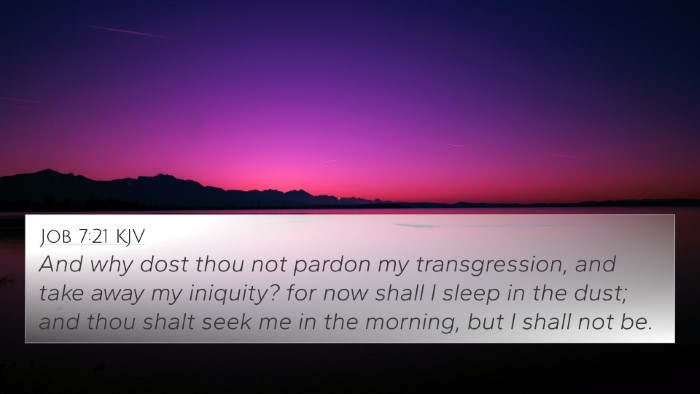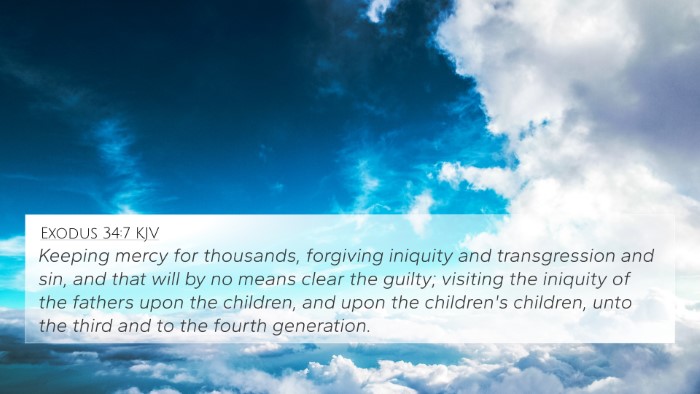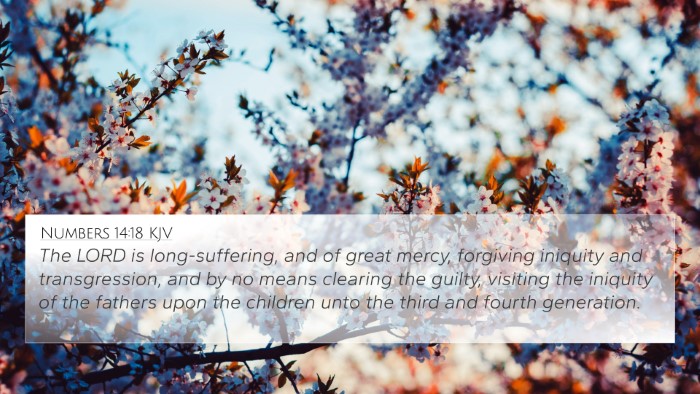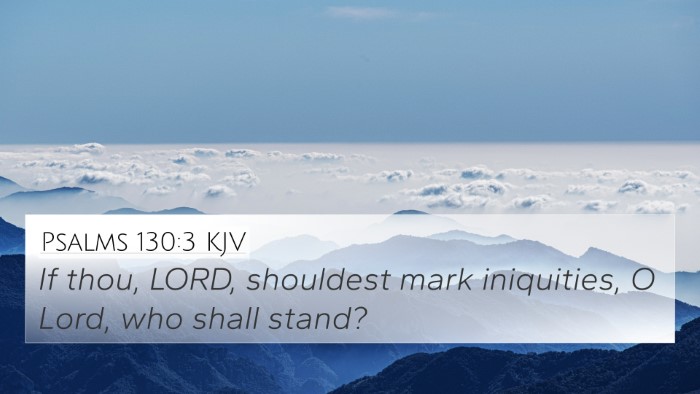Old Testament
Genesis Exodus Leviticus Numbers Deuteronomy Joshua Judges Ruth 1 Samuel 2 Samuel 1 Kings 2 Kings 1 Chronicles 2 Chronicles Ezra Nehemiah Esther Job Psalms Proverbs Ecclesiastes Song of Solomon Isaiah Jeremiah Lamentations Ezekiel Daniel Hosea Joel Amos Obadiah Jonah Micah Nahum Habakkuk Zephaniah Haggai Zechariah MalachiJob 10:14 Similar Verses
Job 10:14 Cross References
If I sin, then thou markest me, and thou wilt not acquit me from mine iniquity.
Uncover the Rich Themes and Topics of This Bible Verse
Listed below are the Bible themes associated with Job 10:14. We invite you to explore each theme to gain deeper insights into the Scriptures.
Job 10:14 Cross Reference Verses
This section features a detailed cross-reference designed to enrich your understanding of the Scriptures. Below, you will find carefully selected verses that echo the themes and teachings related to Job 10:14 KJV. Click on any image to explore detailed analyses of related Bible verses and uncover deeper theological insights.

Job 7:21 (KJV) »
And why dost thou not pardon my transgression, and take away my iniquity? for now shall I sleep in the dust; and thou shalt seek me in the morning, but I shall not be.

Exodus 34:7 (KJV) »
Keeping mercy for thousands, forgiving iniquity and transgression and sin, and that will by no means clear the guilty; visiting the iniquity of the fathers upon the children, and upon the children's children, unto the third and to the fourth generation.

Numbers 14:18 (KJV) »
The LORD is long-suffering, and of great mercy, forgiving iniquity and transgression, and by no means clearing the guilty, visiting the iniquity of the fathers upon the children unto the third and fourth generation.

Job 13:26 (KJV) »
For thou writest bitter things against me, and makest me to possess the iniquities of my youth.
Job 10:14 Verse Analysis and Similar Verses
Job 10:14 reads: "If I sinned, you would be watching me and would not let my offense go unpunished."
This verse captures Job's poignant sense of despair and contemplation as he grapples with the nature of God's judgment and his own sinfulness. Below is a summary of insights from public domain commentaries by Matthew Henry, Albert Barnes, and Adam Clarke regarding this verse.
Interpretation of Job 10:14
Matthew Henry's Commentary
In his commentary, Matthew Henry highlights that Job expresses a deep awareness of God’s omnipresence and omniscience. Job feels that even if he commits a sin, God is closely monitoring him. Henry illustrates that this verse reflects Job's view on divine justice; he understands that any sin he commits will not escape God's notice. Job, therefore, perceives God as an exacting judge, highlighting the tension between human frailty and divine scrutiny.
Albert Barnes' Notes on the Bible
Albert Barnes expands on the idea of Job feeling as if God is ever-watching over him. Barnes points out that Job's assertion serves as a lament, indicating that God’s presence feels suffocating rather than comforting. Until this moment, Job is unable to see God’s mercy amid his suffering, which leads to feelings of isolation and despair. This highlights the complexity of Job's relationship with God during his trials.
Adam Clarke's Commentary
Adam Clarke presents another layer to Job's philosophical query. Clarke discusses the emotional state of Job, who feels trapped by divine judgment. Job seems to ask, "Is there any hope for me?" If he has sinned, he feels there’s no escape from God's judgment. Clarke emphasizes the deep existential struggle Job faces in understanding the nature of divine justice and His relationship with the Almighty.
Bible Verse Cross-References
- Psalm 139:2 - "You know when I sit and when I rise; you perceive my thoughts from afar." This verse echoes the theme of God's omniscience.
- Hebrews 4:13 - "Nothing in all creation is hidden from God’s sight; everything is uncovered and laid bare before the eyes of him to whom we must give account." This reinforces the notion of divine observation.
- Ecclesiastes 12:14 - "For God will bring every deed into judgment, including every hidden thing, whether it is good or evil." This supports the idea of inevitable divine retribution.
- Job 7:17-20 - "What is mankind that you make so much of them, that you give them so much attention... If I have sinned, what have I done to you...?” Job's wrestling with his sinfulness here parallels his plea in Job 10:14.
- Isaiah 59:2 - "But your iniquities have separated you from your God; your sins have hidden his face from you, so that he will not hear." This speaks to the consequence of sin in the relationship with God.
- Romans 14:10 - "For we will all stand before God’s judgment seat." This reinforces the concept of divine judgment that Job feels acutely aware of.
- James 1:15 - "Then after desire has conceived, it gives birth to sin; and sin, when it is full-grown, gives birth to death." This highlights the process of sin and its inevitable consequences.
Thematic Connections
The verse Job 10:14 can be understood through various themes and motifs found throughout the Bible. These include:
- Divine Justice: Job’s assertion of God’s scrutiny connects to other texts that explore themes of justice, retribution, and accountability.
- Suffering and Righteousness: Job’s suffering prompts the question of how suffering intersects with one’s righteousness, a theme explored by other biblical figures like David and Paul.
- Human Limitation vs. Divine Omnipotence: This tension is prevalent throughout scripture as humans grapple with God’s sovereignty.
Cross-Referencing Biblical Texts
This verse invites deeper study into the connections between scripture, allowing for a comparative Bible verse analysis. As seekers of truth wish to identify connections between scriptures, tools for Bible cross-referencing can illuminate the intricate dialogues within biblical texts.
For example, Job's cry can be placed alongside the teachings of Christ in the New Testament, where themes of repentance and divine mercy are discussed. This offers a fuller understanding of God’s nature across both Testaments. Understanding these passages in conjunction can enhance one’s Bible study experience, leading to greater insight into God's character and intentions.
Application for Today
For modern believers, Job 10:14 serves as a reminder of God's omnipresence and invites reflection on personal accountability before God. The concept of sin and its consequences resonates today, encouraging individuals to seek forgiveness, understand God's grace, and live with acknowledgment of a divine watchfulness.
Ultimately, the insights gleaned from Job 10:14, combined with cross-references, create a fabric of theological understanding that underscores the importance of studying scripture in a holistic manner.






